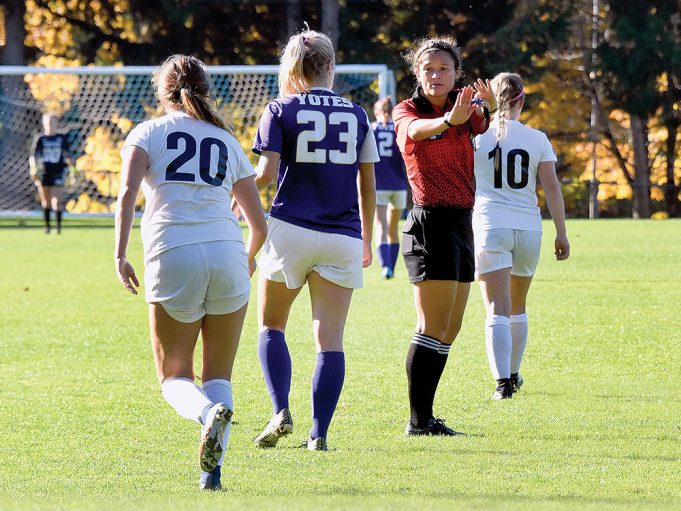For most of the movie “Whiplash,” music instructor Terence Fletcher curses, rails at, belittles and humiliates his students.
When he encounters one of his former charges in a social setting, he lets down his guard and offers a glimpse into his rationale. He employed his Lombardi-esque style, he says, for the students’ own good. He hopes they won’t settle for good enough, that they’ll work harder and someday be better than they thought they could be.
Says Fletcher, “There are no two words in the English language more harmful than, ‘Good job.’”
Fletcher takes that to an extreme, to be sure. Still, he believes anyone who settles for the status quo will never improve. His goal as an instructor is to squeeze every last drop of talent out of each student.
It would be interesting to see the reaction of officials if Fletcher were to trade jazz for officiating and employ those same scorched-earth tactics as an evaluator. After one of Fletcher’s incendiary reviews, the Bobby Knights and Jon Grudens of the world would seem like pussycats by comparison.
Do you, as Fletcher noted, go too far the other way? How often do you walk into the locker room after a game, shake hands with your partner or crewmates and automatically say, “Good job,” before you’ve spent even a moment dissecting the job just completed?
What criteria are you using to determine you truly did a good job? Are kudos from the coaches positive proof that all went well? Do you base it on the fact there were no technicals, cards, ejections or unsportsmanlike penalties?
There are people in all strata of life — including officiating — who overestimate their own abilities. They are the ones who “don’t know they don’t know.”
When you don’t get a playoff assignment, or don’t go as deep in the playoffs as you think you should, do you seek out information as to why? If your ratings are in the dumpster, do you resolve to find out why and work on the areas that need attention?
Set your ego and pride aside and put in the extra time to get better
The officials who rank highest and get the better assignments likely have been in your position in the past. They set their egos and pride aside and put in the extra time and effort necessary rather than grouse and delude themselves with self-congratulations.
Self-analysis can begin after your next game. Not enough officials take advantage of a postgame meeting. If an observer or evaluator isn’t on hand, ask for an honest assessment from your partner or crewmates. Among the topics to talk about: judgment plays, rule interpretations, proper positioning, signaling and mechanics and situation management.
Don’t settle for simply asking, “Did you see anything?” and being satisfied with no response. That’s as bad as automatically thinking everything was hunky dory. A better question to ask might be, “I thought I was out of position, or could have gotten a better angle a couple of times. Am I right?”
Getting better could involve watching yourself on film or asking one of those more successful officials to watch you work and offering advice. But remember that the truth hurts.
Many years ago, another umpire and I asked a decorated colleague to watch us work a baseball game. The observer had a legal pad with several pages of notes. He started to critique the other fellow with such comments as, “You’re dropping your head on pitches in the dirt,” and, “Your timing is a tad quick.” But for every constructive criticism, the umpire responded with, “Yeah, but,” and disagreed. After five or six “Yeah, buts,” the evaluator saw it was a lost cause. He tore the sheets off the pad, crumpled them into a ball and tossed them over his shoulder as he strode off. I picked up the paper and uncrumpled it but I couldn’t read his personal shorthand so I never got the benefit of his review.
Think you already know the rules? Was the score on your latest test below the others on your crew or in your association? In your group study, do you pipe up with answers or let the others handle the heavy lifting? Those are signs you need to dig into the rulebook. Studying isn’t any more fun now than it was when you were in school, but it goes with the territory. And while you’re at it, crack open the mechanics manual as well.
See something in this column that strikes close to home? Gonna take a long, hard look at yourself and set a course for improvement? Good job!
Oops. Sorry. Couldn’t help myself.
What's Your Call? Leave a Comment:
Note: This article is archival in nature. Rules, interpretations, mechanics, philosophies and other information may or may not be correct for the current year.
This article is the copyright of ©Referee Enterprises, Inc., and may not be republished in whole or in part online, in print or in any capacity without expressed written permission from Referee. The article is made available for educational use by individuals.



















